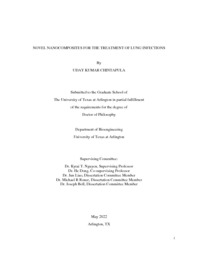
ATTENTION: The works hosted here are being migrated to a new repository that will consolidate resources, improve discoverability, and better show UTA's research impact on the global community. We will update authors as the migration progresses. Please see MavMatrix for more information.
Show simple item record
| dc.contributor.advisor | Nguyen, Kytai T | |
| dc.contributor.advisor | Dong, He | |
| dc.creator | Chintapula, Uday Kumar | |
| dc.date.accessioned | 2023-06-27T23:56:19Z | |
| dc.date.available | 2023-06-27T23:56:19Z | |
| dc.date.created | 2022-05 | |
| dc.date.issued | 2022-05-17 | |
| dc.date.submitted | May 2022 | |
| dc.identifier.uri | http://hdl.handle.net/10106/31350 | |
| dc.description.abstract | Lung infections, especially lower respiratory tract infections and their associated pneumonias, are one of the leading causes of death, accounting for more than 4 million fatalities every year worldwide. Bacterial pathogens are involved in many lower respiratory tract infections including emerging antibiotic resistant respiratory pathogens such as methicillin-resistant staphylococcus aureus (MRSA). Current interventions for MRSA lung infections include systemic antibiotic treatments for an extended period leading to various side effects such as acute kidney injury, nephrotoxicity, and so on. To overcome these limitations, the goal of this dissertation research is to develop a drug delivery system, which includes pathogen-specific drug-loaded nanocomposites for targeting injured cells and ameliorating lung injury caused by these pathogens more effectively than conventional treatments. Specifically, non-invasive techniques such as inhalable formulations of our novel nanocomposites can increase patient compliance, reduce multiple doses, and improve therapeutic efficiency of potent drugs. To reach our goal, two specific aims were followed: (1) To synthesize and characterize nanocomposites comprised of PLGA-based nanoparticles with nanofiber coating as an enhanced drug delivery platform, and (2) To develop and evaluate antimicrobial-loaded nanocomposites for treatment of MRSA lung infections. The main innovative aspects of our system are that it effectively reduces bacterial infections via a unique design strategy of (1) FDA-approved PLGA material-based nanoparticles for loading of antimicrobials drugs to inhibit bacteria growth, (2) Enhanced cellular uptake of our system provided by nanofiber coating of nanoparticles, and (3) Higher bioavailability of drugs at the infected area by employing an inhalable method to deliver the nanocomposites directly to the lung infection tissues. Our results with novel nanocomposites in infected lung epithelial cells show higher uptake compared to nanoparticles. In addition, antimicrobial-loaded nanocomposites significantly reduce the pathogen burden in cells compared to free drug and microbial-loaded nanoparticles. These results suggest the potential of our novel nanocomposites to treat lung infections via a more targeted approach with enhancement in drug delivery. These results indicate that our research might have a significant impact in human health in the future as it might bring an improvement in the treatment of MRSA lung infections by saving many lives and providing efficient therapeutic strategies for lung infections. | |
| dc.format.mimetype | application/pdf | |
| dc.language.iso | en_US | |
| dc.subject | Nanofiber | |
| dc.subject | Antimicrobial nanoparticles | |
| dc.subject | Lung infection | |
| dc.subject | MRSA | |
| dc.subject | Nanocomposites | |
| dc.subject | Enhanced cellular uptake | |
| dc.title | NOVEL NANOCOMPOSITES FOR THE TREATMENT OF LUNG INFECTIONS | |
| dc.type | Thesis | |
| dc.date.updated | 2023-06-27T23:56:19Z | |
| thesis.degree.department | Bioengineering | |
| thesis.degree.grantor | The University of Texas at Arlington | |
| thesis.degree.level | Doctoral | |
| thesis.degree.name | Doctor of Philosophy in Biomedical Engineering | |
| dc.type.material | text | |
| dc.creator.orcid | 0000-0002-6028-4485 | |
Files in this item
- Name:
- CHINTAPULA-DISSERTATION-2022.pdf
- Size:
- 2.076Mb
- Format:
- PDF
This item appears in the following Collection(s)
Show simple item record


